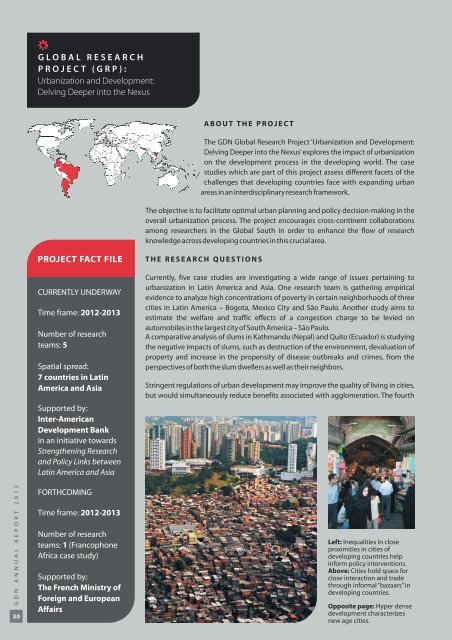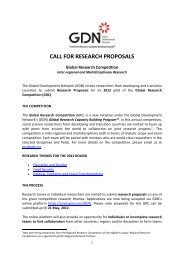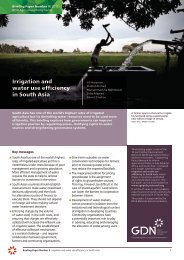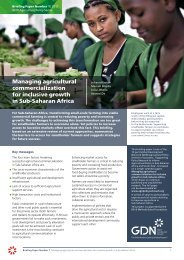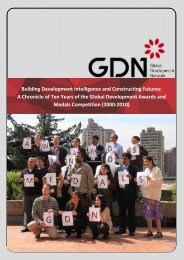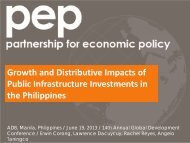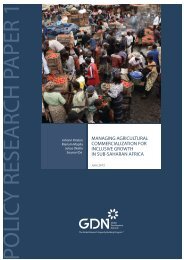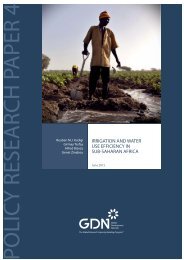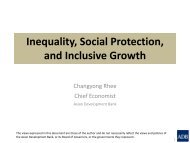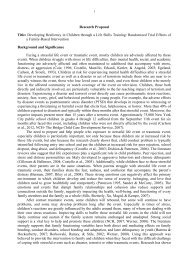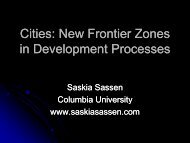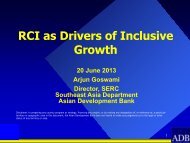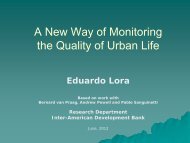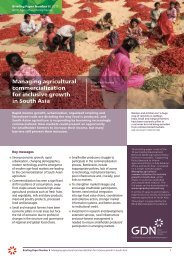ANNUAL REPORT - Global Development Network
ANNUAL REPORT - Global Development Network
ANNUAL REPORT - Global Development Network
Create successful ePaper yourself
Turn your PDF publications into a flip-book with our unique Google optimized e-Paper software.
GLOBAL RESEARCH<br />
PROJECT (GRP):<br />
Urbanization and <strong>Development</strong>:<br />
Delving Deeper into the Nexus<br />
ABOUT THE PROJECT<br />
The GDN <strong>Global</strong> Research Project ‘Urbanization and <strong>Development</strong>:<br />
Delving Deeper into the Nexus’explores the impact of urbanization<br />
on the development process in the developing world. The case<br />
studies which are part of this project assess different facets of the<br />
challenges that developing countries face with expanding urban<br />
areas in an interdisciplinary research framework.<br />
The objective is to facilitate optimal urban planning and policy decision-making in the<br />
overall urbanization process. The project encourages cross-continent collaborations<br />
among researchers in the <strong>Global</strong> South in order to enhance the flow of research<br />
knowledge across developing countries in this crucial area.<br />
PROJECT FACT FILE<br />
CURRENTLY UNDERWAY<br />
Time frame: 2012-2013<br />
Number of research<br />
teams: 5<br />
Spatial spread:<br />
7 countries in Latin<br />
America and Asia<br />
Supported by:<br />
Inter-American<br />
<strong>Development</strong> Bank<br />
in an initiative towards<br />
Strengthening Research<br />
and Policy Links between<br />
Latin America and Asia<br />
THE RESEARCH QUESTIONS<br />
Currently, five case studies are investigating a wide range of issues pertaining to<br />
urbanization in Latin America and Asia. One research team is gathering empirical<br />
evidence to analyze high concentrations of poverty in certain neighborhoods of three<br />
cities in Latin America – Bogota, Mexico City and São Paulo. Another study aims to<br />
estimate the welfare and traffic effects of a congestion charge to be levied on<br />
automobiles in the largest city of South America – São Paulo.<br />
A comparative analysis of slums in Kathmandu (Nepal) and Quito (Ecuador) is studying<br />
the negative impacts of slums, such as destruction of the environment, devaluation of<br />
property and increase in the propensity of disease outbreaks and crimes, from the<br />
perspectives of both the slum dwellers as well as their neighbors.<br />
Stringent regulations of urban development may improve the quality of living in cities,<br />
but would simultaneously reduce benefits associated with agglomeration. The fourth<br />
GDN <strong>ANNUAL</strong> <strong>REPORT</strong> 2012<br />
30<br />
FORTHCOMING<br />
Time frame: 2012-2013<br />
Number of research<br />
teams: 1 (Francophone<br />
Africa case study)<br />
Supported by:<br />
The French Ministry of<br />
Foreign and European<br />
Affairs<br />
Left: Inequalities in close<br />
proximities in cities of<br />
developing countries help<br />
inform policy interventions.<br />
Above: Cities hold space for<br />
close interaction and trade<br />
through informal “bazaars” in<br />
developing countries.<br />
Opposite page: Hyper dense<br />
development characterizes<br />
new age cities.


